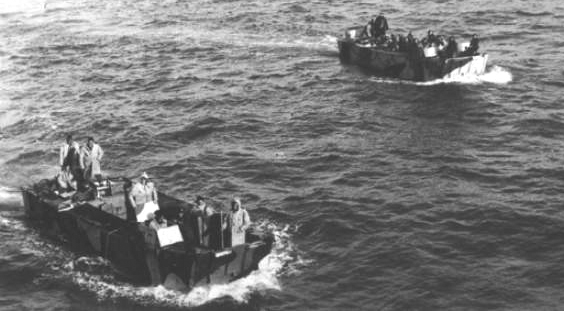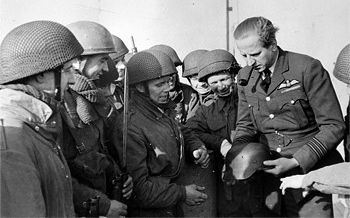I Was There! - Grim Was Our Flight From the Doomed City
The War Illustrated, Volume 5, No. 123, Page 550-551, March 10, 1942.
The majority of the British women and children were evacuated from Singapore before the final Japanese assault. From The Daily Mail correspondent, Cedric Salter, came this impression of the scene on one of the liners engaged in the work of rescue.
Women and children are sleeping on the decks, in hammocks slung from all conceivable supports, and on the floors of packed cabins and saloons aboard this great North Atlantic liner, now a rescue ship. The liner landed Indian reinforcements at Singapore before picking up 900 British women and 500 children to carry them to safety.
Twice we have been attacked. Once a bomb fell only 30 yards away, blotting out one of the tugs helping to nose us out of harbour. All four of the tug's crew were killed, and a dozen small holes were drilled in our own side. But after three days we were out of range of enemy bombers.
There is still need for unceasing vigilance, however, against submarines or surface raiders. In my two-hour turns on watch, shared with the mere handful of men on board. I have seen nothing but the endless waste of blue water. Fierce line squalls occasionally scud across our path, lashing us at our look-out posts with warm rain, which a minute later rises in steam from our clothes as the scorching sun reappears.
The drama of life goes on aboard ship. There have already been four births. Most of the women have left homes and husbands behind in besieged Singapore, but even so the ship has something of the holiday air it used to have on its peacetime fashionable summer cruises.
Only for the hushed quarter of an hour when the news is broadcast from London is there any tension. Gaiety then dies out of faces as the grim story is told of those left behind.
Beach pyjamas or shorts are the mode. But the wearers must wait on themselves, carrying heavy trays from the kitchens to release the skeleton staff of overworked stewards for the actual cooking. Long lines of drying laundry continually flutter in the hot tropical wind.
The greatest hardship is the black-out. It means that every porthole and door must be sealed at night against showing a light. In the airless temperatures of the hundreds the heat becomes intolerable. The result is that now, after nearly a week, some of the children are pale and fretful. Their mothers even are showing signs of strain.
I am writing this in my "quarters" – a mattress under the long muzzle of a gun mounted aft – as Lights Out is being sounded. The faintly phosphorescent wake is stretching away towards the east as the ship bears its cargo from danger towards friendlier land.
Previous and next article from I Was There!
I Was There! - With Unbelievable Suddenness the Barham Sank
Told by Capt. C. E. Morgan of the Valiant to Massy Anderson, Reuter's special correspondent, this dramatic story of H.M.S. Barham's sinking off Sollum on Nov. 25, 1941, has a tragic interest in that M
I Was There! - 'Inside Ten Minutes the Beach Was in Our Hands'
The following account of the British parachute raid on the German radio-location station at Bruneval, near Havre, was given by Reuter's Special Correspondent, who accompanied the expedition in a "comb
Index
Previous article
Strange Adventure of a Sunderland's Crew
Four miles off the coast of Cyrenaica a Sunderland flying-boat crashed into the sea after an engagement with two Messerschmitts, one of which was shot down. The crew were blown to the shore on a wing
Next article
Our Parachutists Led the Way at Bruneval
Wing-Com. Pickard, D.S.O., D.F.C., the leader of the R.A.F. carrying force of bombers which took part in the raid, examines a captured German steel helmet. Photos, British Official: Crown Copyright.





